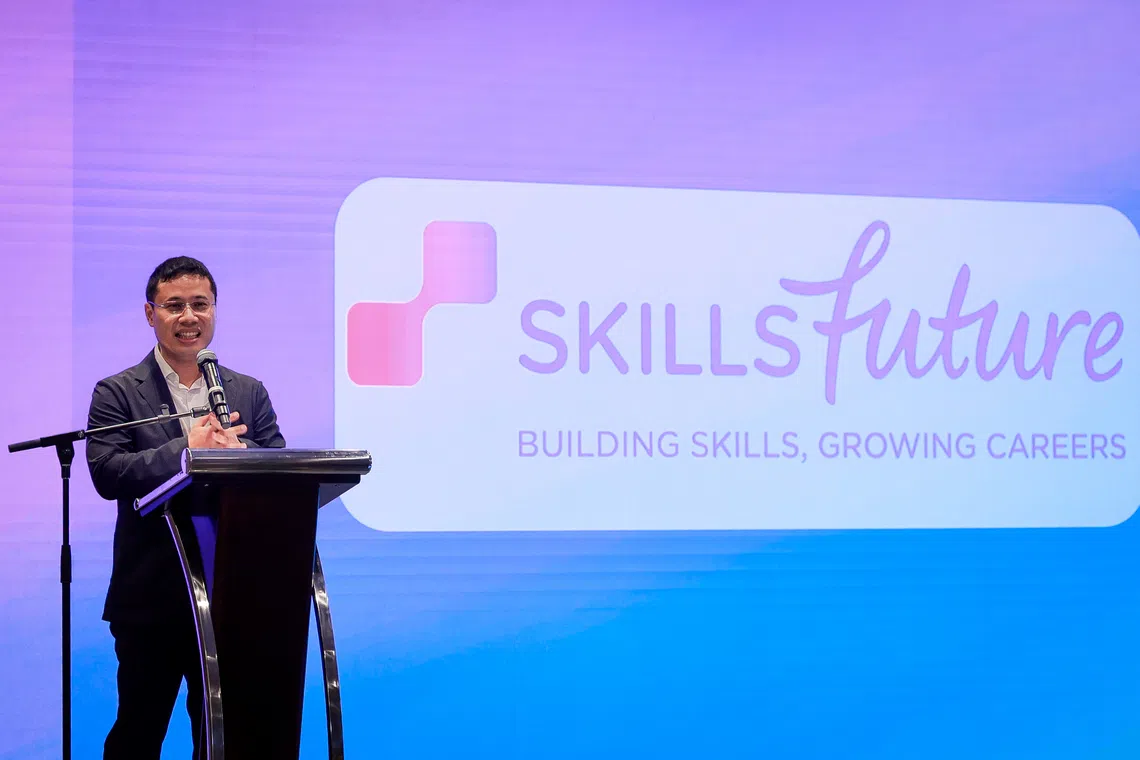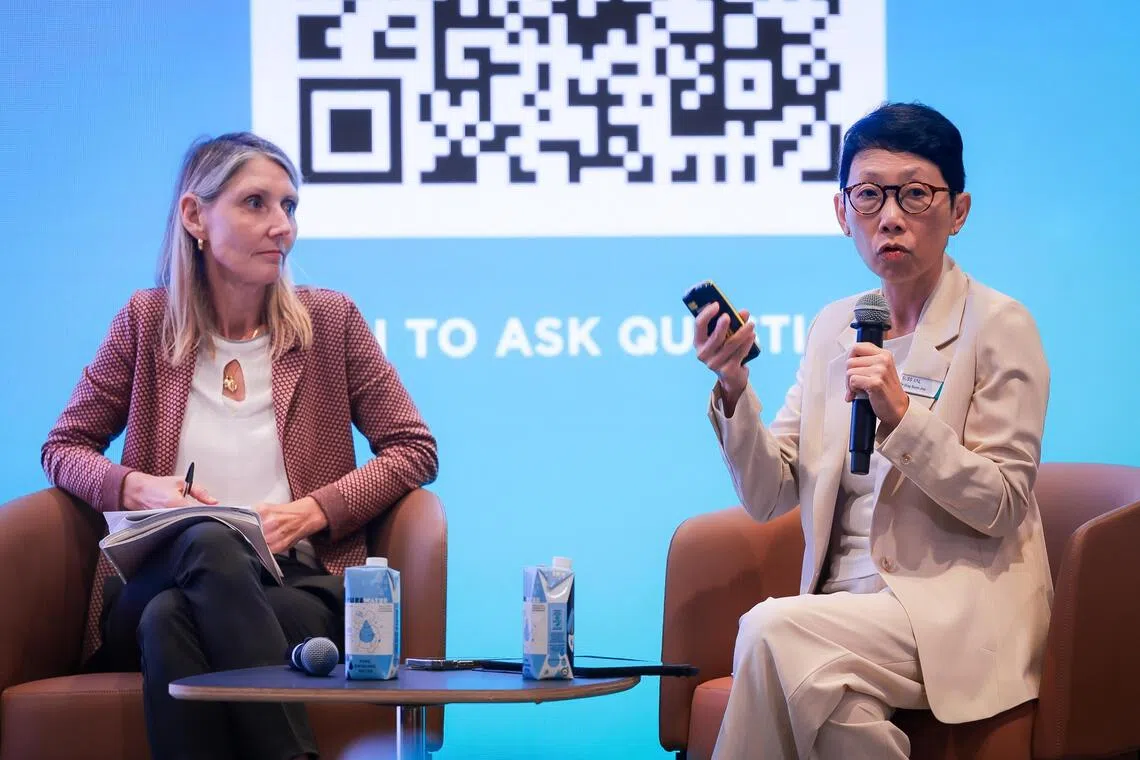Singapore ranks 12th in global skills index, ramps up push for national skills-first approach
Sign up now: Get tips on how to help your child succeed

The findings of the Skills-First Readiness and Adoption Index were announced by Education Minister Desmond Lee on Oct 10.
ST PHOTO: GAVIN FOO
Follow topic:
- Singapore ranks 12th in skills-first adoption globally, with observers saying there is room for improvement in integrating skills into training and recognising/rewarding workers' skills.
- The Skills-First Readiness and Adoption Index highlights Singapore's strengths in learning ecosystem/talent recognition but lags in enabling environment.
- Singapore launches initiatives like the Centre for Skills-First Practices and a unified "common language of skills" (Skills Framework 2.0) by 2026 to promote skills-based hiring and training.
AI generated
SINGAPORE - Singapore ranked 12th out of 30 countries on a new global index measuring how prepared nations are to adopt skills-first practices.
The index evaluates how well countries integrate skills-based approaches into training, recognise and reward workers’ skills, and support a shift towards skills-based hiring and development.
The Skills-First Readiness and Adoption Index by the Organisation for Economic Cooperation and Development and the Institute for Adult Learning (IAL) scored countries based on 25 skill-related indicators.
There is room for improvement, said Education Minister Desmond Lee, who announced the findings on Oct 10 at the launch of the Centre for Skills-First Practices by IAL.
Held at the Lifelong Learning Institute, the event was attended by over 300 participants from industry professionals and educators to policymakers.
In his keynote address, Mr Lee spoke about the need to “double down” on efforts to move to a skills-first approach amid rapid change in people’s careers, as part of a nationwide push to embed such practices across Singapore’s economy.
It is not about choosing between skills and qualifications, but ensuring a focus on skills in hiring, training and career progression, said the minister, who announced initiatives like a new national skills framework and skills dashboards to support employers and workers in this shift.
“If we rely on qualifications alone, we will miss out on the capabilities and experience that formal qualifications may not capture,” he said.
“Individuals could also have picked up skills in the workplace, which may not be reflected in these qualifications or captured in any formal training.”
Mr Lee said that businesses need to proactively identify and invest in skills of workers, while individuals should be deliberate in training and career choices. And training providers need to accurately meet these skills needs.
The index assessed three key areas. First, a country’s learning ecosystem, which refers to how well education and training systems help people build work-ready skills.
Second, talent recognition, which looks at whether skills are recognised and rewarded; and third, an enabling environment, which looks at whether the country has support systems in place to make skills a key driver of employment and growth.
Singapore ranked 10th in learning ecosystem, 11th in talent recognition and 25th for enabling environment.
These results show “relative strength” but also indicate that skills-first hiring practices remain limited, said Dr Gog Soon Joo, a fellow at IAL, who presented the index at the event.
The Republic’s learning ecosystem ranking shows that the usefulness and impact of training could be improved, she added.
“Hiring in Singapore remains highly credential-focused, where employers continue to place a strong emphasis on degrees, among the 30 countries surveyed,” she said.
Dr Gog added that only 41 per cent of adults in Singapore report finding training highly useful, citing results from the Programme for the International Assessment of Adult Competencies
“We ought to ask ourselves, when we design learning assessments, to what extent are these helpful,” she said. “There is room for improvement for education training providers to think harder about how to enhance learning relevance.”

Dr Glenda Quintini (left), head of the OECD’s skills and future readiness division, and Dr Gog Soon Joo, fellow at the Institute for Adult Learning (IAL), at the launch of the Centre for Skills-First Practices by IAL.
ST PHOTO: GAVIN FOO
Singapore’s low rank in the “enabling environment” category is mainly because statutory training leave – paid time off for job-related learning – is not mandated here, Dr Gog said.
Public spending on education as a share of Singapore’s gross domestic product is the lowest among all countries surveyed, she pointed out.
“This is because Singapore emphasises accessibility and targeted investment,” she said, and even without mandatory training leave, learners have access to SkillsFuture Credits and modular bite-sized courses.
Mr Lee said the new centre will help to drive the implementation of skills-first practices by developing tools that translate job requirements to skills requirements, and position Singapore as a thought leader in this area.
The centre will support employers who are keen to adopt such practices and provide individuals insights on how jobs are evolving, he said. It will also help to make job skills insights more accessible to training providers and the public.
As such, a new national skills framework will be launched by SkillsFuture Singapore (SSG) in mid-2026, to guide how Singaporeans learn, work and hire, said Mr Lee.
The Skills Framework 2.0 will consolidate the existing 38 frameworks across various sectors like media, early childhood, social services, healthcare and infocomm technology.
It will serve as a “common language of skills” to map how jobs, tasks and skills are connected across sectors, said Mr Lee.
“Employers can better articulate their skills gaps, training providers can activate the supply of skills required and individuals can acquire these in-demand skills through training,” he added.
“Ultimately, the success of the skills-first movement requires active support from all parts of society,” Mr Lee said.
“If we succeed in this endeavour, we will open more economic opportunities and pathways for Singaporeans, empower our businesses to be more adaptable and progressive, and engender a SkillsFuture movement that enables Singaporeans to succeed in a future of rapid change and uncertainty.”


